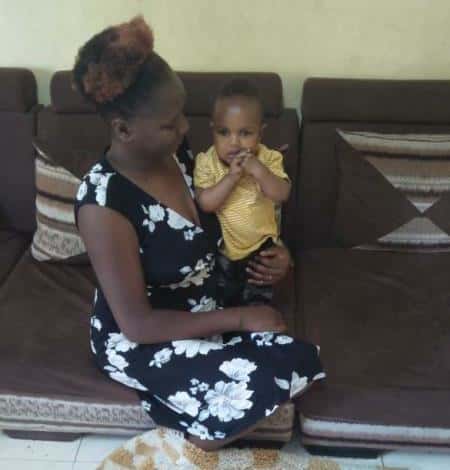

Lucy Maina at home in Nakuru with her son Ethan who contracted coronavirus at six months, but has now recovered. [Mercy Kahenda, Standard]
Since the first case of coronavirus was reported in the country, many mothers have dreaded the possibility of their child contracting it.
When Lucy Maina’s son Ethan came down with a fever in October, she didn’t give it much thought. She assumed he would soon feel better after taking the usual medication.
But as days went by, six-month-old Ethan’s fever did not ease, he lost appetite and developed a persistent cough.
The baby also had disturbed sleep, cried a lot and was uneasy on most nights. At this point Ms Maina, a nurse at the Rift Valley Provincial General Hospital, Nakuru, got worried and she had every reason to be. She had just recovered from the virus a few weeks before her baby became ill.
“My baby could not sleep, he was cranky and restless. I was worried and took him for several tests that turned negative. But on further assessments and tests, he tested positive for Covid-19. I was devastated,” recalls the mother.
The news hit Maina hard.
“I always thought that the baby was safe in my hands. When I tested positive, I made sure I followed all protocols to keep my baby safe from the virus. But now that he was positive I was shocked. How would I isolate him when he was still breastfeeding?” she poses.
Face her fears
She had to face her fears and have the baby treated. Today, she recalls how her son’s recovery journey toughened her.
When Ethan’s symptoms persisted, the mother took him to the Rift Valley Provincial General Hospital, Nakuru, where it was confirmed he had Covid-19.
Luckily, the infant was stable and was released to go home with strict instructions to the mother to continue breastfeeding him.
Maina was also expected to limit contact with the infant, clean hands with soap and water and wear a face mask all the time when handling him. So how was all this possible? To minimise contact, the baby was isolated in the sitting room, and his elder siblings and mother spent more time in the other rooms.
During the isolation period, Maina would wear an N95 surgical face mask in line with the Ministry of Health home-based care protocol. Day by day, the mother took care of the baby under the difficult circumstances but luckily after 10 days of battling the virus, Ethan tested negative twice for Covid-19.
“We had good and bad days. I used to wake up early morning and bask in the sun, to avoid passing the virus to my children. I was always in a face mask,” narrates Maina.
Though she was traumatised then, she found a support group, that encouraged her to live positively and support the baby in his recovery journey.
When The Standard visited the baby, he was bubbly and was playing with his older siblings. Maina’s advice to parents whose children contract the virus is to avoid panic, remain vigilant in monitoring their health and work closely with a paediatrician.
Do not panic
Dr Ombeva Malande, a Senior Consultant in Paediatric infectious diseases, says majority of children are household contacts of adults.
Dr Malande says at least 1,500 children in Kenya have contracted the virus with the youngest being a neonate.
Unlike in adults where the disease presents itself with symptoms, majority of children are asymptomatic, with speedy recovery, according to the expert. He says recovery in children is also faster.
“Clinical course of Covid-19 in children is less severe and the hospital outcomes tend to be better in critically ill children than in adults,” he says.
Breastfeeding is encouraged to boost the baby’s immunity.
Today, Maina looks back at her son’s recovery journey with gratitude. Ethan is now a healthy eight-month-old baby and is being weaned.